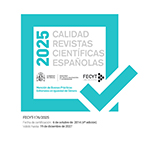Interacción compleja del estilo atribucional, autorregulación y resiliencia respecto del rendimiento en matemáticas
Resumen
El presente estudio examina el rol de variables de tipo socio-emocionales que se relacionen con el rendimiento escolar de los estudiantes en matemáticas de educación secundaria (N=1498), tales como los estilos atributivos respecto del éxito o fracaso escolar, estrategias de autorregulación o control de estudios, y resiliencia respecto del rendimiento académico en matemáticas. Con un enfoque cuantitativo y un Modelo de Ecuaciones Estructurales, se destaca el papel del estilo atributivo interno como variable relevante de la variabilidad de las calificaciones en matemáticas y su rol mediador respecto de habilidades cognitivas como el control del estudio, o aquellas más ligadas al nivel emocional como la resiliencia. El género no constituye una variable moderadora de los resultados.Se discuten los hallazgos y sus proyecciones en el ámbito educativo, especialmente por el hecho que dichas variables pueden ser objeto de intervención por parte de profesores o agentes educativos. Estas intervenciones de los profesores podría permitir acceder a los estudiantes de contextos de alta vulnerabilidad social a una educación de calidad por sobre los elementos estructurales de la alta estratificación social del sistema chileno.
Descargas
Descarga artículo
Licencia
La Revista Complutense de Educación, para fomentar el intercambio global del conocimiento, facilita el acceso sin restricciones a sus contenidos desde el momento de su publicación en la presente edición electrónica, y por eso es una revista de acceso abierto. Los originales publicados en esta revista son propiedad de la Universidad Complutense de Madrid y es obligatorio citar su procedencia en cualquier reproducción total o parcial. Todos los contenidos se distribuyen bajo una licencia de uso y distribución Creative Commons Reconocimiento 4.0 (CC BY 4.0). Esta circunstancia ha de hacerse constar expresamente de esta forma cuando sea necesario. Puede consultar la versión informativa y el texto legal de la licencia.











